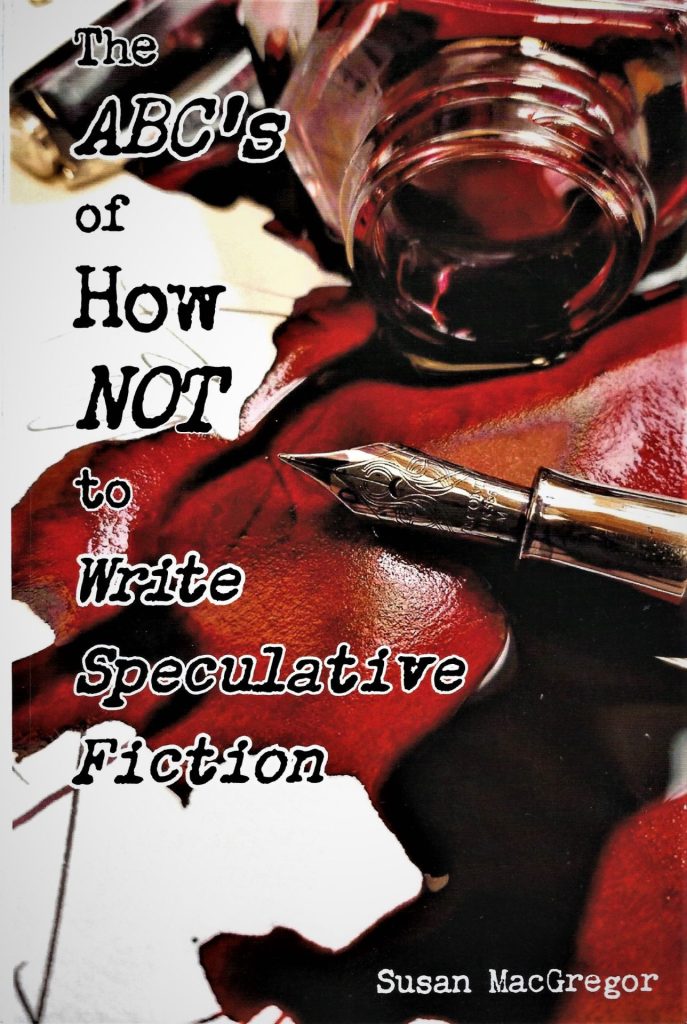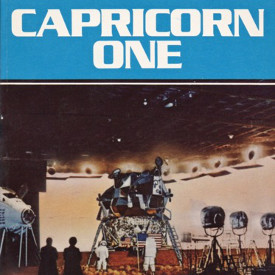
OBIR: Occasional Biased and Ignorant Reviews reflecting this reader’s opinion.

The ABC’s of How NOT to Write Speculative Fiction – by Susan MacGregor
Publisher: Three of Pentacles Press, Edmonton, Alberta, Canada, 3rd edition, 2021.
Cover Design by Erin C.V. MacGregor
Premise:
Writers need to know their craft. Base level ignorance will result in an editor paraphrasing the immortal words of Ed Wood Jr. to describe your manuscript: “It’s dead, murdered, and its author is responsible!” Here’s how to avoid killing your story.
Review:
I’ve struggled to be a writer since I was a teenager. During my lifetime I acquired a few books to help guide me. After all, why not seek the advice of those who know better? Some of the books have come and gone, but here are the ones I yet retain in my personal library.
Not everyone enjoys lists. But, hey, if Rabelais could get away with numerous lengthy lists in Gargantua and Pantagruel, which no editor has ever seen fit to cut out, I figure it can’t hurt to imitate him. Mind you, the editors of The Penguin Companion to World Literature wrote of Rabelais “His influence was immediate and great, but attempts to copy his characters, style, enormous vocabulary and colourful language have all failed.”
Perhaps I carry on that tradition of failure. No matter. Like him, I’m trying to make a point or two.
First, the basics:
– Handy Grammar Reference: A Guide to Better English – by Robert L. Shurter, McGraw-Hill, 1959.
– The Elements of Style – by William Strunk Jr. & E.B. White, Macmillan Publishing, 3rd edition, 1979.
Then the Canadian angle:
– Writing for Money in Canada – by Raymond Hull, Longmans Canada Limited, 1969.
– The Little English Handbook for Canadians – by James B. Bell & Edward P.J. Corbett, Wiley Publishers of Canada, 1977.
– Write Right! A Canadian Desk-drawer Digest of Punctuation, Grammar and Style – by Jan Venolia, Self-Counsel Press, 1989.
And then , more to the point of my wanting to be a science fiction author:
– The Art of Fiction: Notes on Craft for Young Writers – by John Gardner, Vintage Books, 1985.
– How to Write Science Fiction and Fantasy – by Orson Scott Card, Writers Digest Books, 1990.
– Writing Science Fiction and Fantasy: Dynamic Essays by Today’s Top Professionals – by various authors and by the editors of Analog and Asimov’s Science Fiction, Davis Publications, 1991.
– How to Write Tales of Horror, Fantasy and Science Fiction – by various authors, edited by J.N. Williamson, Writers Digest Books, 1991.
– Self-Editing for Fiction Writers: How to Edit Yourself into Print – by Rennie Browne & Dave King, HarperCollins Books, 1993.
– Writing to the Point: A complete Guide to Selling Fiction – by Algis Budrys, Unifont Company, 3rd edition, 1994.
– Science Fiction and Fantasy Writers of America Handbook: The Professional Writer’s Guide to Being Professional – by various authors, edited by Jon M. Gustafson. Fat Puppy Press, 1995.
In my opinion all of these are worth adding to your library, if you can find them.
Must be lots of important stuff between the covers, right? Read through them and come out knowing how to write saleable fiction? Well, probably. I wouldn’t know. I don’t remember.
The one thing they have in common is that I haven’t picked any of them up since the turn of the century. It’s not that I wouldn’t understand them. Comprehension is not a problem. What renders reading the books pointless are my memorization skills. By the time I finished I would already have forgotten most of it, and the remainder would soon dissipate over the following month or two. I used to perform prodigies of memory back in my university days. Can’t do that now.
Not just a matter of becoming a senior. The trend is many decades old. It’s something I’ve gotten used to. Fortunately, it’s not as bad as it sounds. The way I see it, much of what I’ve read, indeed the whole of my life experience, resides in my subconscious mind. Consciously, shallow creature that I be, I am well-suited to my second childhood, but hidden within my Id is the adult I used to be, indeed even the youth I used to be striving to become an adult. In short, I am still capable of learning, but at a subconscious level.
This is part of the secret of being a writer (I don’t know the secret of being a successful writer). Adapt, adjust, and cope with whatever life brings you. Example: In my latest attempt at writing a novel, I didn’t do any advance planning or research. No point really, as I’d forget my notes no matter how many times I read them. Better to simply write off the top of my head, letting my subconscious take charge. It knows far more than I do. It helped me complete a first draft and now “we” are working on a second draft revision. Not only is my subconscious mind guiding my path, it works while I’m asleep. A writing partner who works 24/7. The ideal writing partner. See? Getting old is not a handicap. Take advantage of any and all changes and transformations. You’d be a fool not to.
So, I turn to Susan MacGregor’s The ABC’s of How NOT to write Speculative Fiction with enthusiasm and keen interest. I take for granted I will forget most of it (like I do everything else) but also that it will prove a mine of useful information my subconscious will plunder over and over again to useful purpose.
What makes me so confident? Although an author of numerous published short stories and her Aurora Award-nominated Tattooed Witch trilogy, she is not simply an author sharing the benefit of her personal experiences with rejection to write a book on the subject. She is an accomplished editor, having edited several anthologies, but most important of all, having ploughed through two decades of the On Spec Magazine slush pile, literally reading thousands of submissions, most of them exhibiting the typical mistakes and errors of beginning authors (and sad to point out, many write for decades without ever learning from their mistakes, hence the need for a book like this), she’s learned a thing or two. So to speak, Susan has a Masters Degree in the study of Bad Writing. She, more than most writers, I suspect, knows what not to do. We all need to read her book and benefit from her experience.
In her own words: “At approximately 1000 manuscripts (or more) per year, and over a twenty year period, it’s a pretty good estimate to say I’ve read over 20,000 short story manuscripts. If you want to understand where the common writing faults lie, become a fiction editor and deal with the never-ending slush pile.”
Another reason I’m interested in her book has to do with my being editor and publisher of Polar Borealis Magazine. I have published (including the latest issue almost ready to come out) 21 issues containing a total of 204 short stories. I average 100 submissions per issue, so that’s about 2,100 stories in my slush pile to date. Nothing compared to Susan’s experience, but enough to give me a degree of empathetic curiosity as to what she has to say.
But the general value of her book is clear enough. As she puts it: “Whether you’re just starting out, or whether you’ve been writing for awhile, these ABC’s will help you see where your writing is going wrong. If you’re self-publishing, it will save you the future embarrassment of clumsy work, because you won’t be repeating the mistakes I illustrate here—you’ll know better. If you’re hoping to submit your work to traditional publishers, your chance of success will improve.”
In other words, no matter what sort of fiction you are writing, no matter where you intend to place it, this book is aimed at you and will save you a lot of grief if you take it to heart.
As an editor, the single biggest problem I’ve noticed in submissions is a failure to turn in a finished draft. Too often it is apparent the author is still struggling to articulate precisely what it is they mean to say. So, I opened the pages of Susan’s book to find out what she considers the biggest problem beginning writers exhibit. This question remains unanswered. In a sense she treats all problems equally.
To put it another way, she decided to organize her topics alphabetically. For example, “C is for Character, Character Stereotypes, Character Sympathy, Clichés, Climaxes.” In broad terms it is thus possible to search through the table of contents and go immediately to her thoughts and advice on a particular topic, such as ”Obscenity” or “Point of View.”
Yet a few alphabetical entries are a tad puzzling. “K is for Kangaroos & Other Beasties.” Puzzling and intriguing. The topics in this section turn out to be four flaws to avoid, namely #1) “The protagonist is an animal or an alien stereotype,” #2) “The character is a human dressed in an animal/alien suit,” #3) “The character is so much of an animal or an alien that the reader can’t relate,” and #4) “The character is an insult.” Much to think about here. Certainly emphasises that one of the greatest difficulties in writing SF is coming up with truly alien physiologies with amazingly alien mentalities that nevertheless remain relatable and even exciting.
In general every topic within the alphabetical entry features an explanation of what the good version is supposed to be, followed by several examples of the wrong way of doing it, often with a brief statement making it clear precisely why it is wrong. Here is a sample:
“Be careful mixing a line of speech with an action. For example, this doesn’t work:
‘Give me a break,’ Steve glowered.
(Did you spot the error? If not, look again.)
This is the correct way to write that sentence.
‘Give me a break.’ Steve glowered.
Or, ‘Give me a break,’ Steve grumbled.
Steve can’t speak a ‘glower.’ The difference is in the punctuation and the verb. In the second example, instead of a comma following ‘break’, a period is used. In the last example, a comma is used because Steve can grumble. (Picky, I know. But that’s writing. Get used to it.)”
Susan has a way with pithy comments telling you what to do or not do. Adds a personal touch. Sometimes she leaves out examples of mistakes and shoots it to you straight, as in “I don’t mind the occasional adverb… but use them sparingly. Too many adverbs draw attention and remind the reader he’s reading. They break reader flow.”
I consider this observation brilliant. Knocking the reader out of the story is a definite no-no. Do NOT remind the reader they are reading. It is perhaps the worst possible sin a writer can commit. Avoid it at all costs. Do it too often and the reader may throw your book against the wall and never pick it up again. Readers want to be immersed in your story, not rejected and expelled.
Every now and then Susan concludes a topic with a tips section. Here you will find advice such as: “Watch out for literal interpretations of body language that create weird or humorous mental visuals” or “Use exposition to transition between scenes. Keep the exposition short, so you can get on with the good stuff” and “Friends and family are NOT reliable sources of feedback, unless they are professional agents, writers, editors and publishers.”
Susan is precise and concise, and occasionally flavours her comments with a wry sense of humour. But what is most important is how vivid and apt her advice is. Much of it is indeed “common sense” and is the sort of thing that seems obvious but not until it has been pointed out. Much is revealed that never occurred to me before. But what I particularly like are the deft surprises. “Don’t remind the reader they are reading” is the classic example.
Others which strike me are: “The point of any violent scene should be to give one’s audience an emotional, visceral, and by the end of the work, an insightful experience.”
And “If you think you are being subtle and sophisticated, it may be you’re only being vague.”
Or “Don’t treat your readers as if you’re forcing them at gun point to listen to you pontificate in a museum.”
Lots and lots of good advice written in such away as to hammer home the points with impact enough to make me ponder the implications. I’m quite convinced my subconscious is absorbing it all like an especially thirsty sponge. No mere dry exercise in technique, this is a “How NOT to” book swimming with style.
I’m a bit worried, though. Many of Susan’s comments to do with dramatic tension, characterization, and exposition seem to specifically target my treatment of my novel. I think I’m going to have to pause my second draft attempt while I contemplate what it is I need to do to avoid sabotaging my own work. Many things, apparently. Strikes me Susan’s book is going to prove invaluable.
Every paragraph in The ABC’s of How NOT to Write Speculative Fiction is well worth quoting, but I’m stopping here because I don’t want to give to much away. I’ll just say the book is not only informative to read but highly entertaining. You should read it.
Now I choose to digress by writing about Raymond Hull’s Writing for Money in Canada. I knew Raymond Hull. My mother used to type his manuscripts. I often played chess with him. He was quite the character, dry and sparse to a fault, yet endearing. I remember several times attending parties he threw for writer friends. He always served a bowl of Triscuits and a bowl of grapes. Nothing more. He didn’t drink. After three hours he would clap his hands and order everybody out. It was time for him to get back to writing. He wouldn’t let anything stand in the way of his daily quota.
He wrote many “How to” books, such as Profitable Playwriting, How to Get What You Want, and The Art of Making Wine. Probably his most famous book was The Peter Principle which he co-authored with Laurence J.H. Peter. In my copy he wrote “Graeme. Greetings, and take care at all times to avoid the level of incompetence.” Alas, the jury is still out on that.
Writing for Money in Canada is typical of Raymond’s style. Everything is logically laid out and clear as a bell. Though much of his advice is dated, much is still sound. He points out that many writers “think that the life they lead and the people they know are dull and uninteresting, offering no inspiration for writing… If life seems uninteresting to you that is because you are bored with it… boredom springs from superficiality… So write. Writing will force you to observe closely, and you will find that everything and everybody will become interesting.”
His comments on novel writing, written circa 1968, are interesting to contrast with the modern market. He wrote: “Most book writers begin by writing novels. Unfortunately, the market for novels, like that for short stories, is smaller than it once was… Many novels do not sell very well. The average selling life of a novel is nine weeks. The typical novel writer, if he is a steady producer, earns about eighteen hundred dollars a year from his books… I once heard a publisher say, ‘Most novels are written by university professors and housewives. Nobody else can afford to write them…’ Nine would-be book writers out of ten are writing novels, so the competition to fill that small demand is keen.” Methinks the situation is much worse today.
And here be an interesting observation: “A fairly recent development is the simultaneous printing of hardcover and paperback editions of a book. One might think that, when both versions are available, nobody would buy the more expensive. In fact, many people who buy the paperback version for themselves, and enjoy it, will buy hardcover copies, at four times the price, to give to their friends. An interesting sociological tidbit!” Possibly still valid, though maybe in terms of people reading ebooks and then giving POD copies to their friends?
In reference to the Science Fiction market, he wrote: “It is not enough nowadays to create some new kind of bug-eyed monster and have him kidnap the heroine. Most writers and many readers of science fiction have considerable scientific knowledge. So stories should be credible and technically sound.”
Ever the practical type, he comments on the Sex-and-Sadism market: “Relaxation of public morals has allowed the printing of many books that once would have earned their authors and publishers nothing more than a jail sentence. If you like reading these books, you know what they are about, and you might enjoy writing them.”
Well, that advice was of no use to me. But I did pick up a number of pointers from Raymond’s book, such as always write on an empty stomach and aim for a thousand words a day. Mind you, he wrote “a thousand saleable words a day” but I found the task a trifle easier leaving out that particular word. Maybe Susan’s book will help me put it back in.
CONCLUSION:
Susan MacGregor’s The ABC’s of How NOT to Write Speculative Fiction is that rare and wonderful thing, a how-to manual which is a delight to read. Highly recommended. I love it.
Check it out: < TheABC’s of How NOT to Write Speculative Fiction >










